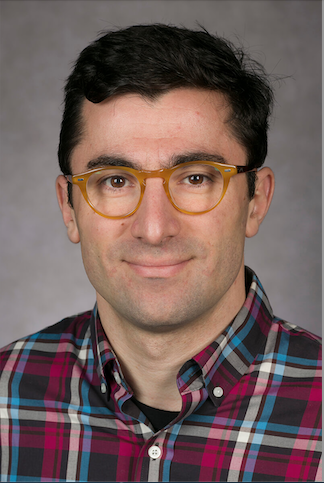PRISM Seminar Series
The PRISM Seminar Series brings together leading voices from academia, industry, policy, and community organizations to explore privacy and security challenges affecting marginalized and vulnerable populations.
Hosted by the Center for Privacy and Security of Marginalized and Vulnerable Populations (PRISM) and supported by the National Science Foundation, this ongoing virtual series has connected researchers and practitioners since March 2024.
Seminars are held approximately every other month on the third Thursday, at 2pm ET / 11am PT. Zoom registration is required. Some speakers may offer small-group discussions following the talk with advance sign-up.
Interested in speaking or nominating a colleague?
Contact:miriam.buhr@eng.ufl.edu
Stay informed about upcoming PRISM talks
Join the PRISM Speaker Series mailing list to receive updates about upcoming speakers, events, and recordings.
Next Seminar
- Wired Wisdom: How to Age Better Online
 Eszter Hargittai, PhD Professor and Chair of Internet Use and Society Department of Communication and Media Research University of Zurich Wired Wisdom: How to Age Better Online April 23, 2026 |… Read more: Wired Wisdom: How to Age Better Online
Eszter Hargittai, PhD Professor and Chair of Internet Use and Society Department of Communication and Media Research University of Zurich Wired Wisdom: How to Age Better Online April 23, 2026 |… Read more: Wired Wisdom: How to Age Better Online
Past Events
Partnership in Practice: Co‑Creating Sociotechnical Futures with Underserved Communities
February 19, 2026 | 2pm ET / 11am PT
(Followed by a student meeting at 3pm ET/12pm PT)

Speaker: Katie A. Siek, (Professor, Informatics, Indiana University, Luddy School of Informatics, Computing, and Engineering)
Bio:
Katie Siek is a professor at Indiana University. Her primary research interests are in human computer interaction, health informatics, and ubiquitous computing. More specifically, she is interested in how sociotechnical interventions affect personal health and wellbeing. Her research is supported by the National Institutes of Health, the Robert Wood Johnson Foundation, and the National Science Foundation including a five-year NSF CAREER award. She has been awarded with the IU Trustees Teaching Award (2022), FACET’s Mumford Excellence in Extraordinary Teaching Award (2021), NCWIT Undergraduate Research Mentoring Award (2019), a CRA-W Borg Early Career Award (2012), and Scottish Informatics and Computer Science Alliance Distinguished Visiting Fellowships (2010 & 2015). Dr. Siek currently serves as an elected member of the Computing Research Association Board and appointed member of the Association of Computing Machinery Diversity, Equity, and Inclusion Council. Prior to returning to her alma mater, she was a professor for 7 years at the University of Colorado Boulder. She earned her PhD and MS at Indiana University Bloomington in computer science and her BS in computer science at Eckerd College.
Host: Kevin Butler (University of Florida)
Abstract:
Community-Based Participatory Research (CBPR) is a powerful framework for centering the lived experiences, priorities, and constraints of marginalized and stigmatized communities who are disproportionally affected by sociotechnical harms. CBPR demands a shift from traditional researcher‑driven approaches toward long‑term, equitable partnerships in which communities engage in all processes. Effectively “doing” CBPR involves a substantial time commitment, often requiring researchers to spend years building the rapport and trust necessary for a mutually beneficial relationship. This collaborative process frequently encounters tensions rooted in mismatches between academic expectations, research ideals, institutional requirements, and community needs. Drawing on two case studies from low resource and stigmatized groups, I illustrate the evolving interpersonal, ethical, and sociotechnical challenges researchers encounter and highlight opportunities to co‑create practices that empower underserved populations to design systems for the future.
Unchartered Deception Realms for Blind and Low Vision Users in Modern Cyberspace
December 18, 2025 | 2pm ET / 11am PT
(Followed by a student meeting at 3pm ET / 12pm PT)

Speaker: Filipo Sharevski (Associate Professor, DePaul University)
Bio:
Filipo Sharevski, PhD is an associate professor of cybersecurity at DePaul University. He is the director of the Actionable Cybersecurity & Accessibility Lab (ACAL) leading research projects focused on usable and inclusive security, social engineering, as well as misinformation in interactive, generative, and immersive forms targeting at-risk users. As a founding member of the National Cybersecurity Teaching Academy (NCTA), he also leads projects related to equitable access to cybersecurity education on a high-school level across the United States.
Host: Kevin Butler (University of Florida)
Abstract:
The central theme of this talk is the tacit shift from conventional, interactive deceptiveness to increasingly generative/immersive deceptiveness that particularly targets blind and low vision users dependent on assistive technology. A couple of cases in point will be presented to illustrate the need for rapid reinterpretation of defenses, in both practical and ontological terms, against adversarial capabilities that include covert observation and AI-enabled fabrications. The first case is the use of smart glasses such as the Meta RayBan or Oakley to covertly observe — or shoulder surf — blind and low vision people in various public settings, a population that traditionally relied on accessibility-as-a-defense (e.g., screen curtains) against a bystander threat. The second case builds on the capabilities used in the first one as it demonstrates how an adversary could use any recorded observation (not just screens’ pins and passwords, but more so voice and other biometrics) from the smart glasses to impersonate a given person and target a blind and low vision user with a cloned voice and a convincing social engineering pretext (so-called “family emergency scams”). Both cases, supported by evidence from ongoing studies, will be used to discuss open defense issues and usable security proposals developed with participants’ input, through co-design sessions. As an unchartered realm of deceptiveness, the talk aims to solicit active feedback from the audience in utilizing the experiences of protecting people reliant on assistive technologies for protection proposals of the general user population against harms previously conceivable only in science fiction contexts.
Privacy-Preserving Humanitarian Aid Distribution
May 22, 2025 | 2pm ET / 11am PT
(Followed by a student meeting at 3pm ET / 12pm PT)

Speaker: Wouter Lueks (Tenure-Track Faculty Member, CISPA Helmholz Center for Information Security)
Bio:
Wouter Lueks is a tenure-track faculty member at the CISPA Helmholz Center for Information Security in Saarbrücken, German. Before that he was a postdoctoral researcher at EPFL in Lausanne, Switzerland where he worked with Carmela Troncoso. He is interested in solving real-world problems by designing end-to-end privacy-friendly systems. To do so he combines privacy, applied cryptography, and systems research. His work has real-world impact. For instance, his designs for privacy-friendly contact tracing have been deployed in millions of phones around the world, and his secure document search system is being deployed by a large organization for investigative journalists.
Host: Kevin Butler (University of Florida)
Abstract:
Humanitarian aid-distribution programs help bring physical goods to people in need. Traditional paper-based solutions to support aid distribution do not scale to large populations and are hard to secure. Existing digital solutions, on the other hand, risk creating serious harms to recipients by collecting large amounts of personal information including sometimes biometric data. This talk covers our collaboration with the International Committee of the Red Cross to design digital aid-distribution systems with strong protection. We’ll see how we used privacy-enhancing technologies to prevent harm to vulnerable aid recipients; and touch on our experience working with humanitarian organizations.
Decoding Abusive Adversaries for Safer Digital Systems
January 16, 2025 | 2pm ET / 11am PT
(Followed by a student meeting at 3pm ET / 12pm PT)

Speaker: Rosanna Bellini (Assistant Professor, NYU)
Bio:
Rosanna Bellini is an Assistant Professor in the Department of Computer Science & Engineering at New York University, Tandon. Her research develops data-driven and engaged research methods to tackle complex societal challenges, such as technology-enabled harms. The outcomes of her research has helped to prompt legislative changes and improvements to consumer-facing financial applications, benefiting tens of millions of customers. She also helps to lead the Clinic to End Tech Abuse, a frontline service for survivors of technology-facilitated abuse, and has personally helped over 150 survivors reclaim their privacy, security, and financial freedom.
Host: Tadayoshi Kohno (University of Washington)
Abstract:
Marginalized and vulnerable population groups today face threats to their digital safety that most computing systems were never designed to protect them from: those closest to them. Abusive adversaries leverage their close social and physical proximity to their target to stalk, harass, and control by taking ample advantage of standard user interfaces and ineffective anti-abuse mechanisms. I describe my research focused on intimate partner violence where I: pioneer approaches to engaging with abusive adversaries first hand across online and in-person contexts, bolster specialized tech support services for those targeted, and develop new frameworks for building abuse-resilient technologies.
Black Lives Matter from a Computational Perspective
September 19, 2024 | 2pm ET / 11am PT
(Followed by a student meeting at 3pm ET / 12pm PT)

Speaker: Fabio Rojas (Virginia L. Roberts Professor of Sociology, Indiana University)
Bio:
Fabio Rojas is the Virginia L. Roberts Professor of Sociology at Indiana University, Bloomington. He is also the co-editor of Contexts: Sociology for the Public, the official magazine of the American Sociological Association. His books include From Black Power to Black Studies: How a Radical Social Movement Became an Academic Discipline, Party in the Street: The Antiwar Movement and the Democratic Party after 9/11, and Theory for the Working Sociologist. His work has appeared in the American Journal of Sociology, Social Forces, and the Academy of Management Journal. He has written for The Washington Post, USA Today, The Hill, and other popular outlets.
Host: Apu Kapadia (Indiana University)
Abstract:
Black Lives Matter was one of the most influential social movements in American from 2014-2020. This talk will survey recent research that uses large scale digital data to understand the movement’s birth, evolution, and impact. First, we ask: how did the “crowd” on Twitter define the movement through hashtag use in its early days? Second, how did BLM street protest bolster antiracism discourse in American culture? Third, what structural factors contributed to BLM protest? This work draws on work done with IU sociology and informatics alumni: Jelani Ince, Clayton Davis, Harry Yan & Zackary Dunivin.
Thinking systematically about race and gender-based discrimination: Connecting discrimination theory, statistical methods, and the needs of marginalized populations
May 16, 2024 | 2pm ET / 11am PT
(Followed by a student meeting at 3pm ET / 12pm PT)

Speaker: Edo Navot(Assistant Professor, Department of Sociology and Criminology & Law, University of Florida)
Bio:
Edo Navot, PhD. is an Assistant Professor in the Department of Sociology and Criminology & Law at the University of Florida. His background is in economics and sociology. Dr. Navot’s research focuses on employment discrimination, race- and gender-based pay gaps, and income and wealth inequality. Before joining the faculty of the UF, he was a labor economist at the U.S. Department of Labor where he worked on civil rights, with a focus on equal employment opportunity and discrimination. Dr. Navot has published research on how factors that reduce labor’s bargaining power exacerbate earnings inequality, particularly in fringe benefits, both in the economy in general and among females and racial minorities. He has conducted research on how employee beliefs in potential workplace discrimination may lead to self-fulfilling prophesies in employee and supervisor behavior and evaluations.
Host: Kevin Butler (Florida)
Abstract:
How do social scientists theorize and explain persistent disparities in employment and pay rates for marginalized and vulnerable populations? How are different theories of disparities implicitly expressed, or embodied, in different methods used to diagnose and describe disparities in group-level outcomes? This talk will substantively focus on how we explain group-level disparities in pay and employment. These disparities include phenomena like the gender pay gap (the tendency of women to earn lower salaries relative to equally qualified men), racial bias in hiring rates, the fact that women are overrepresented within “feminized” occupations like care work while underrepresented in “masculinized” occupations like engineering (and that gender pay gaps are higher in masculinized occupations), the fact that African Americans are overrepresented in occupations that predominantly require manual and menial labor, and other related issues.
Working with and for Community Security and Privacy
(Followed by a student meeting at 3-3:45pm ET / 12-12:45pm PT)

Speaker: Matt Mitchell
Bio:
Matt Mitchell is a hacker and founder of CryptoHarlem. In 2021, Matt graced the cover of Newsweek magazine and was named one of America’s Greatest Disruptors. That year he was awarded a Pioneer Award by the Electronic Frontier Foundation, in 2020 named a WIRED25 by Wired magazine, and in 2017 named a Human of The Year by Vice Motherboard.
Matt is a well known security researcher, operational security trainer, and data journalist. His organization CryptoHarlem (https://cryptoharlem.com), hosts impromptu workshops teaching basic cryptography tools to the predominately African American community in upper Manhattan. Matt worked as an independent digital security/counter surveillance trainer for media and humanitarian focused private security firms. His personal work focuses on marginalized, aggressively monitored, over-policed populations in the United States. Matt sits on the Network Investment Council of Reset Tech (https://www.reset.tech/people/#network-investment-council), and the board of Action Squared Inc. ( https://actionnetwork.org/about ).

Matt is a member of the advisory board to the Open Technology Fund (https://www.opentech.fund/about/people/), the board of the NGOISAC (non governmental organization information sharing and analysis center https://ngoisac.org/) and on the board of Action Square. Matt was also an advisor to the Internet Freedom Festival, the Digital Security Exchange, Citizen Clinic at Berkeley University Center for Long Term Cybersecurity, and The 4th Amendment Center at the National Association of Criminal Defense Lawyers.
Host: Elissa Redmiles (Georgetown)
Abstract: TBD
